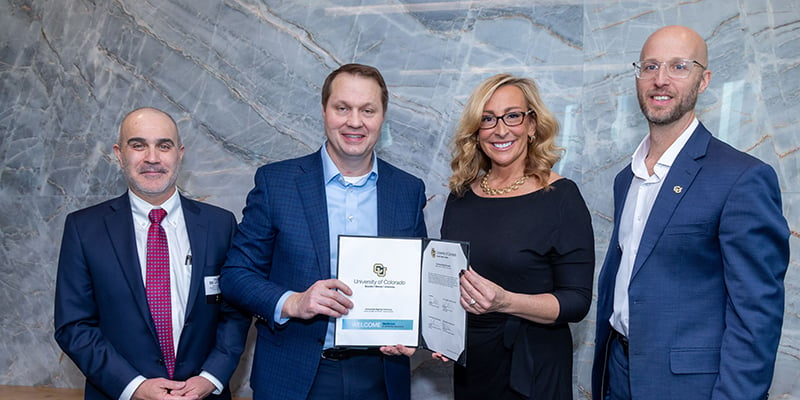As the nation struggles with a persistent epidemic of opioid addiction, the University of Colorado Anschutz Medical Campus is taking a critical step that will allow its graduates to better treat patients and save lives.
A $450,000 grant from the Substance Abuse and Mental Health Services Administration (SAMHSA), spread over three years, will create a training program that will qualify medical, nurse practitioner, and physician assistant students to provide buprenorphine products to treat opioid-dependent patients. This means students will finish the training before graduation rather than after, making them eligible to provide medication-assisted treatment sooner.
“Buprenorphine saves lives,” said project director D. Tyler Coyle, MD, an addiction expert and psychiatry instructor at the University of Colorado School of Medicine. “We want CU Anschutz graduates to prescribe buprenorphine products for opioid use disorder in a safe and effective way. Our team is excited to integrate the Interprofessional Clinical Opioid Use Disorder (ICLOUD) curriculum into the student learning experience.”
Buprenorphine, in conjunction with behavioral therapy, is considered one of the best evidence-based treatments for opioid use disorder. And getting the required training earlier means more health care providers can treat patients who need help.
The Drug Abuse Treatment Act of 2000 (DATA 2000) increased access to buprenorphine products for opioid use disorder. But before prescribing the drug, health care providers must first undergo at least 8 hours of training to qualify for a DATA waiver. Under the current system, that means getting certified after graduation – which can be time-consuming and difficult for new graduates.
“This grant project comes along when the Child Health Associate / Physician Assistant (CHA/PA) program is already making efforts to transform and update our curriculum, and it fits nicely with many of the other interprofessional opportunities we provide our students,” said Amy Akerman, MPAS, PA-C, assistant professor, academic coordinator and global health track advisor at the CU School of Medicine.
Akerman said the CHA/PA program is committed to treating opioid dependence head on.
“We want to provide our students with the best education and opportunity for practicing skills necessary for treating patients with substance use disorders,” she said.
Scott Harpin, PhD, MPH, RN, said the kind of interprofessional education funded by the grant “is the epitome of where health care delivery is going in the future.”
“It’s a natural extension of what we’ve been doing so well here at CU in terms of bringing students together early on in their education to improve systems of care as a model for the future of primary care and prevention,” said Harpin, an associate professor at the CU College of Nursing. “This will allow us to be more agile in responding to Colorado’s needs.”
The first students are expected to complete the training in fall of 2020.



